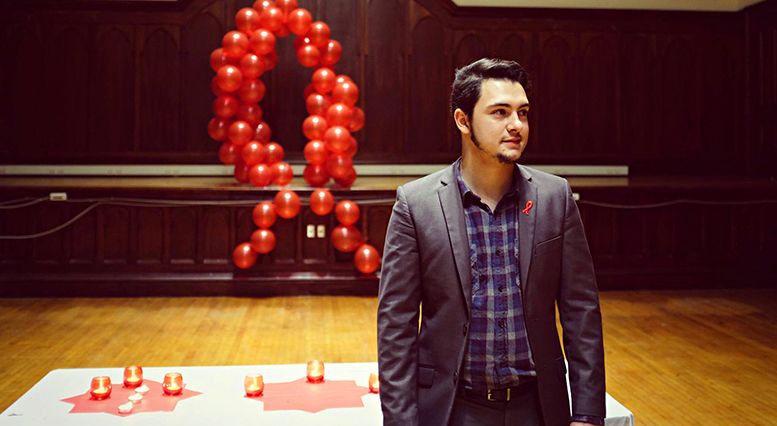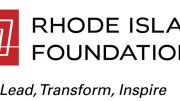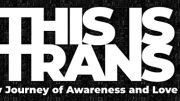Spanish speakers can find support in this Western Massachusetts newly-formed organization
By: Nick Collins/TRT Intern and Al Gentile/TRT Reporter—
HOLYOKE, Mass.—The day Paolo Salvador found out he was HIV-positive, his world came crashing down.
“I was trembling,” Salvador said. “I had literally the time I got up from that table to the time I got back to my partner to figure out how I was going to tell him.”
Project LIFE (Live Inspire Further Educate), a new nonprofit created by Salvador, aims to serve those living with HIV/AIDS in the Western part of Massachusetts.
Project LIFE was founded in 2017 by Salvador after he was diagnosed with HIV at age 19. The diagnosis hit home for him; he had lost his aunt to the same disease several years earlier. And the questions that came with HIV—such as how to tell his partner—troubled him as well.
“It tore me apart,” he wrote on the Project Life website. But after months of research, Salvador learned more about the disease and became determined to, “create a program that educates not only those who are [HIV] positive but all of those in our community.”
Through his research, Salvador learned that education for everyone affected by HIV and AIDS—not only those with a diagnosis but their friends and family as well—was missing.
“It was just focused on people who are living with it,” he said. “It wasn’t even focused on their partners, it wasn’t focused on the general public getting educated. It wasn’t focused on testing. It really was focused on getting people who are living with HIV the care that they need, and I feel like there is so much more to it than that because, living with HIV, yeah, medication is a huge part of it, but there’s also the mental health part of it.”
Based in the western Massachusetts city of Holyoke, Project LIFE is, “committed to creating and providing support, advocacy, and education to and for the underserved HIV-positive community, to increase their access to resources and effectively address the roots of social inequities,” according to its mission statement.
The nonprofit’s website features a series of HIV/AIDS educational videos including, among others, “HIV: Stopping the Virus Starts with You,” “HIV: What’s Going on Inside Your Body,” and “HIV: Avoiding Resistance.” In order to further their mission of community outreach, Project Life also hosts peer support groups, partners with a local Chicopee soup kitchen, and works with local housing agencies to help find clients homes.
Facing the Stigma
The inequities experienced by people with HIV/AIDS, Salvador said, are in large part because of the stigma surrounding the virus.
“You can live a very long life with HIV,” Salvador said. “Mentally, we haven’t really made much progress as a community on getting educated on what HIV is, and what the risks are, and how to support somebody who is living with it.”
Very often, according to Salvador, the stigma surrounding HIV/AIDS leaves those infected feeling as though they are living in a world that will never understand or accept them. This isolation, and the resulting depression, anxiety, and loneliness, can have extremely detrimental impacts.
“It’s difficult to tell people even though you’re not personally worried about it, it’s difficult to tell family,” Salvador said. “Family automatically assumes you’re going to die, and you have to go through the whole explanation of how you contracted it, and all that kind of stuff.”
Derek Cartagena, who works as a secretary for Project LIFE, said the stigma surrounding HIV/AIDS is in many ways its own sickness.
With the medical advancements and social movements that have changed the face of HIV/AIDS over nearly 40 years, Cartagena said there is still so much work to be done.
“Stigma is an invisible force. It [takes] the voice out of people,” Cartagena said. “You can come so far, and have all these accomplishments and achievements, but if you don’t voice them, the world will think you haven’t done much. That’s what I think stigma does—stigma puts a muzzle over anything.”
One of the biggest consequences of the stigma surrounding HIV/AIDS, Cartagena said, is society understanding how most people are connected in some way with the virus. Dispelling this, Cartagena believes, will help to end the virus once and for all.
“Everyone is connected to it. That’s the most important thing for everyone to recognize,” he said. “It’s like cancer … it’s in everyone’s lives. You have to understand and be unified by it in that way. Once you have knowledge, you have a responsible awareness, and once you have that you have a duty, to want to do more and help.”
Facing a Growing Monster
Funding for HIV/AIDS support, whether through treatment, extended services, or education, has been waning in Massachusetts.
Organizations all over the state have had to limit services—and in some cases close altogether—because of dwindling federal and state funds. In western Massachusetts, such major players in the fight against HIV/AIDS such as the AIDS Foundation, are among many casualties in the fight against the virus.
Based in Chicopee, Massachusetts, the AIDS Foundation of Western Mass. previously served a similar purpose for more than 20 years until it closed down in September. The nonprofit was founded in 1993 for the purpose of providing comprehensive support services for those living with HIV/AIDS. The AIDS Foundation provided financial assistance to those affected by HIV/AIDS, hosted support groups, and educated communities about the virus. They also helped send children affected by the disease to summer camps so as to provide extra assistance to youth struggling to live with the disease
But changes in the western Massachusetts economy, waning corporate support, and a shift in the public perception about HIV/AIDS led to a dramatic decrease in funding and donor support. The organization closed its doors on September 30, and soon afterwards turned over its assets to a local direct service agency.
The closing of the AIDS Foundation shuttered a significant resource for those living with HIV/AIDS in Western Massachusetts,; but it also created opportunities for other organizations—like Project Life—to take on clients. Jessica Roncarati-Howe, a former AIDS Foundation volunteer and officer, said in an article in The Springfield Republican that the organization was trying to portray the closing, “as not an end but a passing of the torch to other organizations that we are blessed to have in this area.”
It’s in this changing landscape that Salvador sees where Project LIFE, as a newcomer in the fight, can make a difference.
“Our funding is not [dependent on] government funding. We go for our own grants, we do fundraising,” he said. “We don’t really go for the federal grants, because we can’t really be dictated the way the other companies are. In this day and age, we need to focus on everybody as a whole. That’s what makes us different [from] others.”
Celebrating World AIDS Day in 2017, along with various events such as a Paint and Sip fundraiser, have proven successful, according to Salvador.
He said Project LIFE is looking forward to a revived AIDS Walk event in western Massachusetts, as well as World AIDS Day in December, along with several other events in the coming year.
Finding Hope in Project LIFE
Fernando Navarro is a client of Project LIFE, a place where he says he found renewed hope in his fight against his HIV diagnosis.
For Navarro, it’s Project LIFE’s holistic approach—focused around empathy—that makes all the difference.
“Before Project LIFE, I was with another agency for quite some time,” he said. “They did a lot of work for me, but I suppose I’ve always needed more care. I also suffer from substance abuse issues and am in active recovery. It’s important to me to work with a group of people who know what it’s like to walk in my shoes, and have experience and resources to help myself and others get by and that’s what Project LIFE does.”
With dwindling infrastructure, Navarro said the circumstances of people living with HIV/AIDS—especially in western Massachusetts—can be bleak.
“With recent cuts in the budget we have lost so many resources especially out here in Western Massachusetts. It seems like Eastern Massachusetts [and] the Boston area get all [of] the knowledge [and] educational resources as well as the funding for better programs and care,” Navarro said. “The AIDS Foundation has closed after 25 years. The Gandara Center’s HIV/AIDS department closed. And Tapestry Health closed their case management services and the food pantry.”
Navarro believes that all that was lost in other organizations is where Project LIFE finds its own space, and that has been invaluable to him and many others.
“I’m excited to see Project LIFE continue in their missions and primarily to see their effect on changing the perception of people suffering from the disease out here and to promote the LGBTQ community in general,” Navarro said.
Looking Ahead
Project LIFE is making waves in the western Massachusetts community, even without an office. Working on a per-diem basis, Salvador said his team has already been able to change lives.
While working to find a fixed location, Salvador hopes to create in the future a new drop-in center for people in the region who are living with HIV/AIDS.
Perhaps the most important part of the organization’s work, Salvador said, is to help the general public recognize that those living with HIV/AIDS, like any other issue in society, need open arms.
“Have an open mind. Don’t judge people because you don’t know their story,” Salvador advised. “Get educated before you talk and have something to say.”Like with anything else, do your research before you have any strong opinions.”
Project LIFE offers several forms of support for people with HIV/AIDS, and those that stand with them. Visit their website today at www.projectlifeofholyoke.org—which is also translated into Spanish—to donate or find help.







